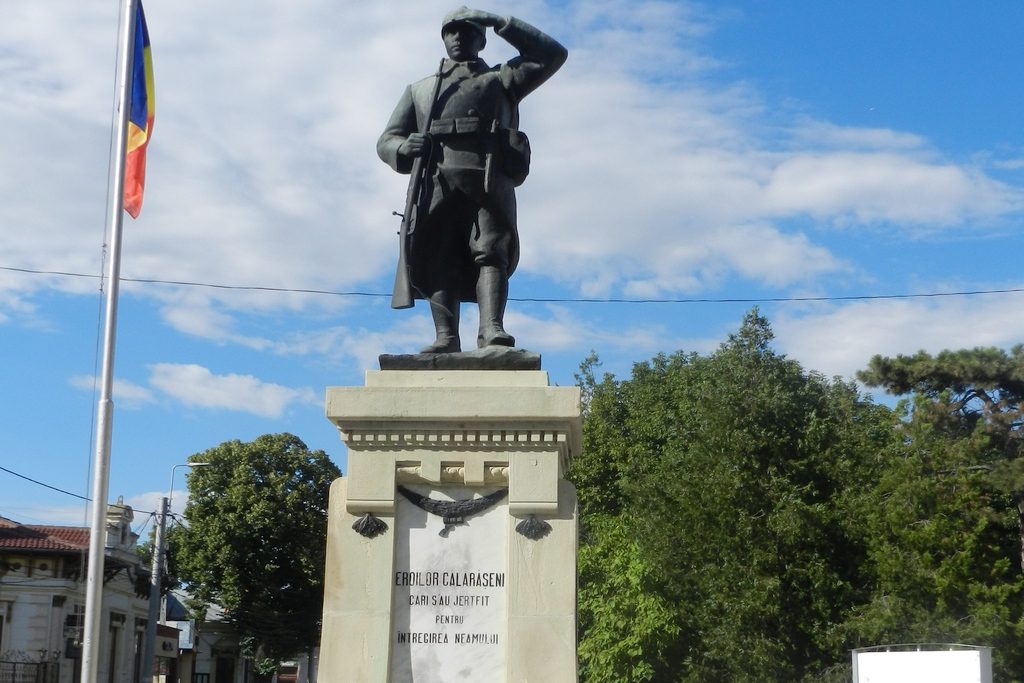

This work was raised by the perseverance of a committee having as president Gh. Cristodorescu and conceived and executed by the sculptor Th. Burca.
The statue, the reliefs, the decorative elements, including the helmet and the laurel branch, were cast in bronze at FABRICA V.V.RĂŞCANU from Bucharest, and the stonework of the shock was entrusted to the stonecutter Dumitrescu.
The participation of Romania at the First World War comprises all the measures and the actions of political, diplomatic and military order developed by the Romanian state, alone or together with the allays, between the 28th of July 1914 and the 11th of November 1918, in order to reach the principal political objective of the participation at the war – the performing of the Romanian national unitary state.
The international system was marked at the end of the XIXth century and the beginning of the XXth century by the rivalry between the great powers for the control of the extra – European world. In Europe, Germany had become the principal power and its behavior on the continent determined an extraordinary decay and re-composition of the alliance in relation with the previous decades.
From the military point of view, Romania came after a victory without glory in the Second Balkan War, the euphoria of the victory making it to pass easily over the lacks manifested in the department of the military command, of the organization and of the instruction of the troops and, especially, of the accomplishments with armament and modern techniques of fighting.
Although connected with the Austrian – Hungarian Empire by a secret alliance treaty, from 1883, Romania chooses to declare itself neutral at the beginning of the hostilities, in July 1914, being prevailed by the interpretation of the relative clauses at “casus foederis”.
In August 1916, Romania receives an ultimatum to decide whether it wants to join Antanta “now or never”. Under the pressure of the ultimatum request, the Romanian government accepts to enter in the war on the side of Antanta, although the situation on the fighting fronts wasn’t a favorable one.
After a series of rapid tactical victories in Transylvania against some Austrian – Hungarian forces overwhelmed from a numerical point of view, the Romanian army will suffer in the fall of the year 1916 a series of smashing defeats, which will force the state’s authorities to take refuge in Moldavia, allowing the enemy to occupy two thirds from the national territory, including the capital Bucharest.
In the winter of 1916 and the spring of the year 1917, under the command of a new military “leadership” (the generals Prezan, Christescu, Grigorescu, Averescu, Văitoianu, etc.) and with the substantial help of the French Military Mission commanded by the general Henri Berthelot, the Romanian Army was reorganized and instructed on modern bases, adapted to the demands of the war.
The campaign from the summer of the year 1917 was a successful one, contriving, in an initial state, the defeat of the troops of the Central Powers in the battles from Mărăști, Oituz and Mărășești. The Romanian military planners intended that hereinafter to develop this offensive in order to start freeing the occupied territory, but the outbreak of the revolution in the Russian Empire led to the abandonment of these plans and passing again to the strategic defensive.
The situation on the eastern front evolved in a negative way, therefore after Russia signed the peace from Brest – Litovsk with the Central Powers, Romania had to demand the truce and then to under the necessity of getting out of the war and to sign a separate peace in humiliating conditions, in the spring of 1918. Fortunately, the refuse of King Ferdinand, who postponed indefinitely the formal gesture of signing this treaty, made possible to restart the hostilities in the last two days of the war, preserving in this way Romania’s statute as belligerent state at the Peace Conference from Paris.
